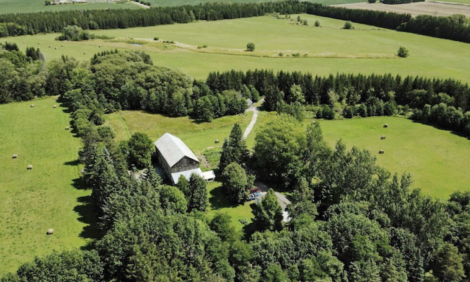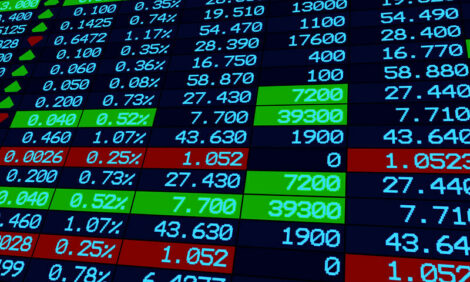



FrieslandCampina Reports Higher Profit on Lower Revenue in Turbulent Year
NETHERLANDS - FrieslandCampina reports that the company's profit in 2016 increased by 5.5 per cent to 362 million euros in comparison to the previous yearThe operating profit declined by 2.3 per cent to €563 million. Adjusted for negative currency effects of €30 million, the operating profit is €593 million. The margin stayed up to par due to the sale of more added-value products, especially in Asia, and lower procurement costs.
The volume of milk supplied by member dairy farmers increased by 7.1 per cent to 10.8 billion kilos. In spite of the growth in volume, revenue decreased by 1.9 per cent to €11.0 billion due to negative currency effects. The cash flow from operating activities decreased to €850 million due to the stocks having a higher value at the end of 2016.
The milk price for member dairy farmers decreased by 6.9 per cent to €32.26 per 100 kilos of milk due to a lower guaranteed price for raw milk. The value creation for members (performance premium and reservation in member bonds) increased by €15 million to €371 million. Per 100 kilos of milk, the value creation decreased by 2.5 per cent to €3.44 due to the fact that milk volume increased more than profit (dilution effect).
Roelof Joosten, CEO Royal FrieslandCampina said: "We are looking back on a turbulent year. Political and economic instability has increased in Africa and in the Middle East. Protectionism is increasing throughout the world. In the first half of 2016, the supply of milk in the European Union was of such magnitude that basic products could only be sold below cost.
"Starting in May, the dairy sector recovered somewhat due to declining milk production in a number of European countries and the relatively low stocks held by buyers. FrieslandCampina anticipated this development by introducing timely price increases in the cheese and butter segment.
"For the coming year, the company’s decisiveness will become even more key to be able to respond to the rapid changes in the market on a timely basis."
Revenue declined
Revenue decreased by 1.9 per cent to €11.0 billion, due to negative currency effects, particularly in countries in Africa. The sales prices decreased by 2.7 per cent. The sales (volumes) of added-value products, including infant nutrition (particularly Friso infant nutrition in China) and dairy-based beverages, increased by 2.8 per cent.
The volume of basic products grew by 2.7 per cent due to the increase in the milk production of the member dairy farmers, which was primarily used for the production of more butter and milk powder.
Minor decline in operating profit
The operating profit in 2016 decreased by 2.3 per cent to €563 million. Currency effects had a negative effect of €30 million on the operating profit.
The gross profit declined by 3.7 per cent to €1,926 million. Without currency effects, the gross profit was constant with respect to 2015. The sales volume increased with lower sales prices and lower costs, as a result of which margins stayed at 2015 levels.
The cost of goods sold decreased by 1.5 per cent to €9,075 million. This is mainly due to the lower guaranteed price for raw milk, cost-saving measures in all business groups and an improvement in purchasing conditions for other raw materials and packaging materials.
There was an improvement in the operating profit of the business groups Consumer Products Asia, Consumer Products China and Cheese, Butter & Milkpowder. The operating profit declined in relation to 2015 for Consumer Products Europe, Middle East & Africa and to a lesser extent for Ingredients.
Higher profit
The profit over 2016 increased by 5.5 per cent to €362 million. The increase in profit is due to the increased sale of added-value products, especially in Asia, the recovery of the sales prices of basic dairy products in the second half of the year, lower procurement costs and a lower tax expense.
Total payment over and above the guaranteed price is increasing
Over 2016, in addition to the guaranteed price, a total of €371 million will be paid out to member dairy farmers (2015: €355 million), the highest amount since the merger at year-end 2008. Of this, the performance premium is €236 million (€2.19 per 100 kilos of milk, excluding VAT).
The issue of member bonds over 2016 amounts to €135 millio (€1.25 per 100 kilos of milk, excluding VAT). In total, the performance premium and the issue of member bonds per 100 kilos of milk amount to €3.44, a 2.5 per cent decline. The milk price for member dairy farmers over 2016 amounts to €32.26 per 100 kilos of milk, excluding VAT. Compared to 2015 (€34.64), this represents a 6.9 per cent decrease.
The guaranteed price over 2016 was €28.38 per 100 kilos of milk, which is a 7.5 per cent decrease compared to 2015 (€30.68). The organic milk price for 2016 amounts to €51.65, excluding VAT, per 100 kilos of milk (2015: €51.80). The organic milk guaranteed price is €47.71 per 100 kilos of milk (2015: €47.77). The performance premium and the issue of member bonds are the same as for regular milk.
Decrease in operating cash flow
The cash flow from operating activities decreased to €850 million (2015: €1,019 million) due to an increase in working capital. In 2016, the outbound cash flow for investments and acquisitions amounted to 955 €million (2015: €705 million).
In 2016, FrieslandCampina invested €518 million. The purpose of the investments was to process the increasing quantity of milk produced by member dairy farmers and to valorise it in products that anticipate the wishes and needs of customers and consumers.
Investments were also made in further improving product quality, safety and efficiency. Since 2009, a total of €3.6 billion has been invested in fixed assets, of which €2.6 billion (over 70 per cent) in the Netherlands. In 2016, €436 million were invested in acquiring a 51 per cent interest in Engro Foods in Pakistan. Disposals of operations and assets yielded €56 million.
Increased pasture grazing
FrieslandCampina encourages pasture grazing. When dairy cows are allowed to graze in the pasture for a minimum of 6 hours a day on at least 120 days per year, the dairy farmer is entitled to a meadow milk premium of gross €1.00 per 100 kilos of milk (effective 2017: €1.50 per 100 kilos of milk).
Furthermore, FrieslandCampina rewards partial pasture grazing with €0.46 per 100 kilos of milk. In 2016 the percentage of member dairy farms in the Netherlands whose cows graze in a pasture increased to 78.2 per cent. This is the second year in a row that the percentage of dairy farms that practices pasture grazing or partial pasture grazing has increased.
Sustainability developments
In 2016, greenhouse gas emissions from production and transport decreased by 4.0 per cent to 925 kt CO2 equivalent. The key reason behind this improvement is the increase in the use of sustainable energy at the production facilities.
In 2016, energy consumption increased by 3.4 per cent to 2.75 GJ/tonne end product. Due to the increase in the milk supply and the growth in the production of infant nutrition and milk powder, more products were produced using more energy-intensive production methods. The energy-reducing effects of new plants will become evident over the coming years.
In 2016 the water consumption of the production facilities decreased by 2.4 per cent to 4.48 m3 per tonne end product. In 2016, the share of raw materials purchased from sustainably managed sources increased to 43 per cent. This represents an increase of 17 percentage points compared to 2015.
Last year, worldwide, 78 per cent of all of the electricity consumed by FrieslandCampina’s production facilities was made sustainable through the purchase of Guarantees of Origin for renewable electricity. This represents an increase of 13 percentage points compared to 2015.
In 2016, FrieslandCampina’s member dairy farmers by means of the Guarantees of Origin for renewable energy supplied 29 per cent of the green electricity consumed by FrieslandCampina throughout the world.
Outlook
Global milk production is expected to rise somewhat in 2017. A marginal increase in milk production is expected within the European Union. In the Netherlands, milk production is expected to decrease due to the introduction of the phosphate reduction measures.
The demand for dairy products in Europe is expected to remain stable or stay on a slightly declining trend. In Africa, the Middle East and South America a further decline in demand is foreseen.
In Asia, particularly in China, a slight increase in the demand for dairy products is expected. As a consequence of the above-mentioned trends, it is expected that the prices for basic dairy products will continue to fluctuate around the year-end 2016/beginning of 2017 level.
Revenue is expected to increase in 2017 due to the acquisition of the controlling interest in Engro Foods, the higher price levels of dairy products and further volume growth in added-value products. Due consideration is provided to an increase in the purchase prices of most raw materials.
In 2017, investments amounting to approximately €500 million are foreseen in quality improvements and the expansion of capacity. In 2017, investments in Research & Development will increase by approximately 10 per cent in order to be able to further improve the competitive position over time.
Focused spending on advertising and promotion, of which increasingly more is spent on digital communications, is to contribute to the growth of brands in the most important product-market combinations.
FrieslandCampina does not make any pronouncements concerning the development of the result in 2017.
TheCattleSite News Desk


